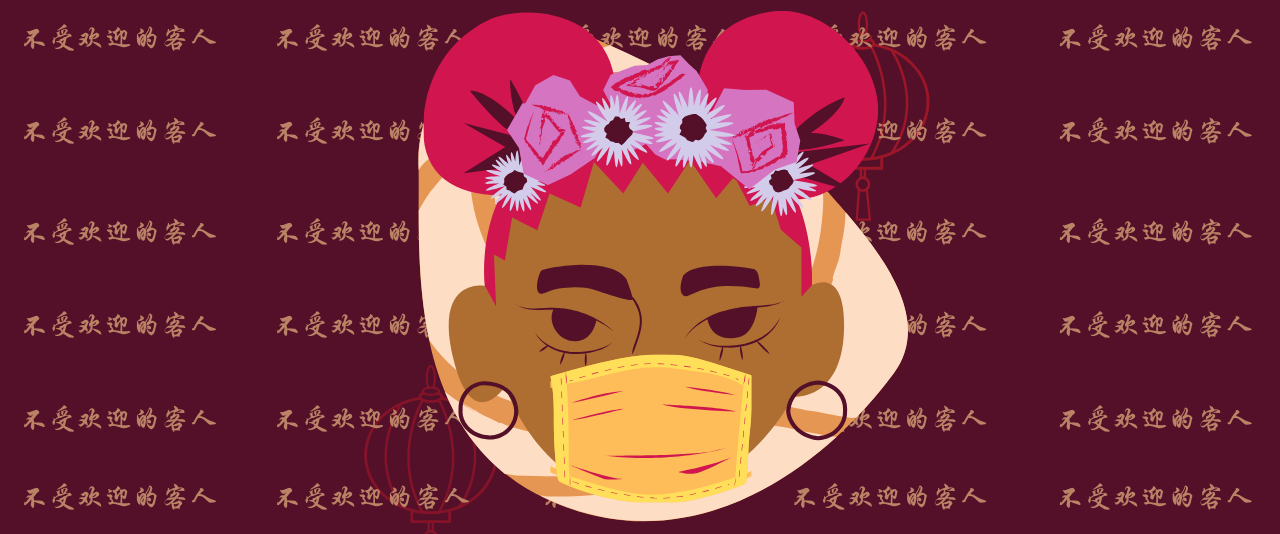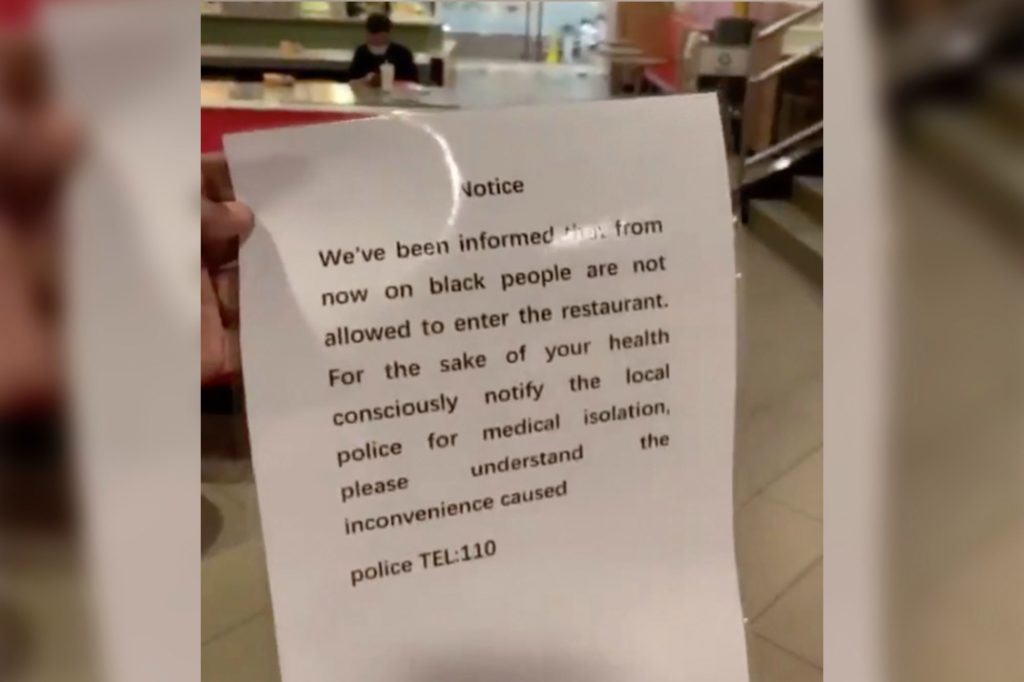
What it’s like to be black in China right now
Racism has become more overt in China since the coronavirus pandemic emerged. From being evicted from their homes to not being served in restaurants, writer Hannah Getachew, interviews black people in the country about their experiences.
Hannah Getachew
28 Apr 2020
After having lived in China for many years, it stands out to me as home to some of the tastiest spicy vegetables I’ve sampled and the most complicated language I’ve studied. But today when I think of China, my mind is clouded by the realities of the coronavirus pandemic.
With coronavirus at the forefront of everyone’s mind, we’ve been immersed in news on its implications for scores of black people, from Ethiopia to South Africa. But what’s it like actually living through the pandemic in China as a black person?
There has always been anti-black racism in China, but episodes of mass testing, forced evictions, homelessness, and barring from restaurants are new.
“The abuse of Africans in China is tantamount to racism, discrimination and a serious violation of human rights,” wrote the Zimbabwean activist Dr Arikana Chihombori-Quao in an open letter to Chinese President Xi Jinping over the recent events in the southern Chinese province of Guangdong and its largest city, Guangzhou.
It all began when a group of five Nigerians in Guangzhou tested positive for coronavirus, four of whom frequently eat at a popular African restaurant in a busy neighbourhood often frequented by black communities. Coupled with the fact that, in my experience, Chinese people assume that all black people in China are somehow linked (perhaps because Chinese communities are so close-knit) rumours that Africans are carrying coronavirus spread like wildfire. Partly to blame are the incomplete news stories by Chinese state media that the virus had been contained and new cases were imported. What they failed to report adequately is that 90% of imported cases were by Chinese nationals.
Instead of dealing with the complexities of imported cases, “Africans became an easy scapegoat” says Ahmadou*, a Cameroonian national who has lived in Beijing for decades.
“My white friend sailed through, but I was singled-out and asked for my temperature to be checked before being served”
McDonald’s, for example, came under fire this month by netizens everywhere for posting a harrowing laminated sign at a Guangzhou branch barring black people from being served at the establishment. It has since apologised but it’s too little too late. Stories of black people being barred entry to establishments born of fear that they are infected with coronavirus are becoming tragically common. Tales of a Mexican restaurant in Beijing, widely popular in the expat community, flat-out refusing to serve a black couple have also emerged. “My boss told me not to allow black people,” they were informed.

Diane*, a black British woman was also racially profiled at a different restaurant in Beijing last weekend. Speaking to me over the phone, she says her “white friend sailed through, but I was singled-out and asked for my temperature to be checked before being served.” She put the servers in their place by calling management.
Similar tales are being reported throughout China as anti-black sentiment increases. A video emerged of a heavily pregnant black woman being denied medical treatment at the gynaecological department of a hospital in Dongguan city. In the video, the man she is with asks whether this is because they are “foreigners”.
Since 5 April, Africans in Guangzhou and indeed all of Guangdong province have answered knocks on their doors to find medical professionals in hazmat suits appearing out of the blue insisting on testing them for coronavirus without offering an explanation. Other Africans in the same area were notified in advance by their universities or landlords that they would be tested, but weren’t offered a justification either, reports Black Livity China.
“It happened because I’m African, other foreigners aren’t treated like this”
In China, all foreigners are required to register at their local police station, which makes it easy to track them down at times like this. Selassie*, an Ethiopian woman living in Guangzhou, was visited by medics on 6 April to test her for coronavirus, saying that if they didn’t call in two days, she was in the clear. “There was no word but three days later they returned and served me quarantine papers saying I couldn’t leave the house for two weeks. It happened because I’m African, other foreigners aren’t treated like this,” she says.
Some Chinese landlords have been pressured to take things further. Sam* was recently evicted from his house in Guangzhou. He received a text message from his landlord, which read: “At present, the residents and property company in our community are very resistant to Africans… The property company also warned us and urged us to sign papers promising not to rent to Africans in the future.”
The deafening silence of African presidents over these incidents are complicated by a growing movement for bilateral debt relief from China. As of 2018, 20% of all debt owed by African governments is to China, making China a top creditor to the continent and the first point of call for a freeze or write-off of debt so African countries can have extra revenue to battle coronavirus. The African Union, on the other hand, has been vocal, warning: “Africa values its relationship with China but not at any price.”
In spite of China’s official statement of non-discrimination and another statement by Chinese foreign ministry spokesperson Zhao Lijian that China does not discriminate against Africans, few are persuaded that these accounts are vicious lies designed to build a wedge between Africa and China. At the same time, it is worth noting that there are sinister forces which wish for the growing relationship between African countries and China to fail for political purposes.
I sometimes wonder if coronavirus is bringing out the worst in people as racism against black people in China and against Chinese people in Africa grows. One particularly distressing incident occurred in Kenya where an enraged crowd gathered on an unpaved street repeatedly yelled “you are Corona!” to a frightened Chinese couple who defended themselves with the retort “We don’t have Corona. Enough!” Although manifested in different forms, Chinese people have also been victims of coronavirus induced racism in the UK and around the world.
“A care package of food supplies was delivered by a Chinese landlord in Wuhan to his Somali tenant not so long ago”
These devastating stories don’t tell the full picture though. For every account of heart-breaking racism and discrimination is another of extraordinary Chinese generosity. Over the 3.5 years I lived in China, and especially when I broke my foot, countless Chinese people were incredibly kind and helpful. Seeing me struggle to move around, a stranger once offered to carry me and my crutches on her electric scooter to save me from hopping down an unpaved road like a three-pronged mess.
Nyamkye*, a Ghanaian in Beijing, has been on lockdown in his university campus for nearly three months now. He spends his days confined to a tiny room barely big enough for a single bed, desk and mini-fridge.
“In the beginning, it was hard to access the ingredients necessary to cook Ghanaian food. Shelves of the campus grocery store were threadbare,” he says.
“After some time I got in touch with the Chinese store which I used to buy rice, oil and other food supplies from and explained that the shelves at our campus store were sorely lacking. Not only did they agree to personally deliver their own goods to campus, but they buy chicken and fish at other stores for us and deliver those too.”
Nyamkye isn’t alone in being supported by Chinese people. “A care package of food supplies was delivered by a Chinese landlord in Wuhan (the first epicentre of coronavirus) to his Somali tenant not so long ago,” says Menelik*, an Ethiopian national.
Random acts of kindness by Chinese people aren’t uncommon to foreigners. Racism is certainly a pervasive problem, especially in Guangzhou where it’s been in the headlines, but it’s hard to characterise a population of 1.4 billion people with a singular brush stroke. It’s safe to say that race relations in China are at a low point. All these stories of mistreatment won’t soon be forgotten by the black people who have lived through them nor the global black diaspora.
Yet, China is likely to remain an attractive destination for black students, teachers and entrepreneurs. Their resilience has carried them through racism and discrimination before and it’s unlikely to stop any from pursuing their goals whether it’s in China or elsewhere.
*Names have been changed to protect identities

Britain’s policing was built on racism. Abolition is unavoidable

How Pakistan’s Khwaja Sira and transgender communities are fearing and fighting for their futures

Their anti-rape performance went viral globally. Now what?





